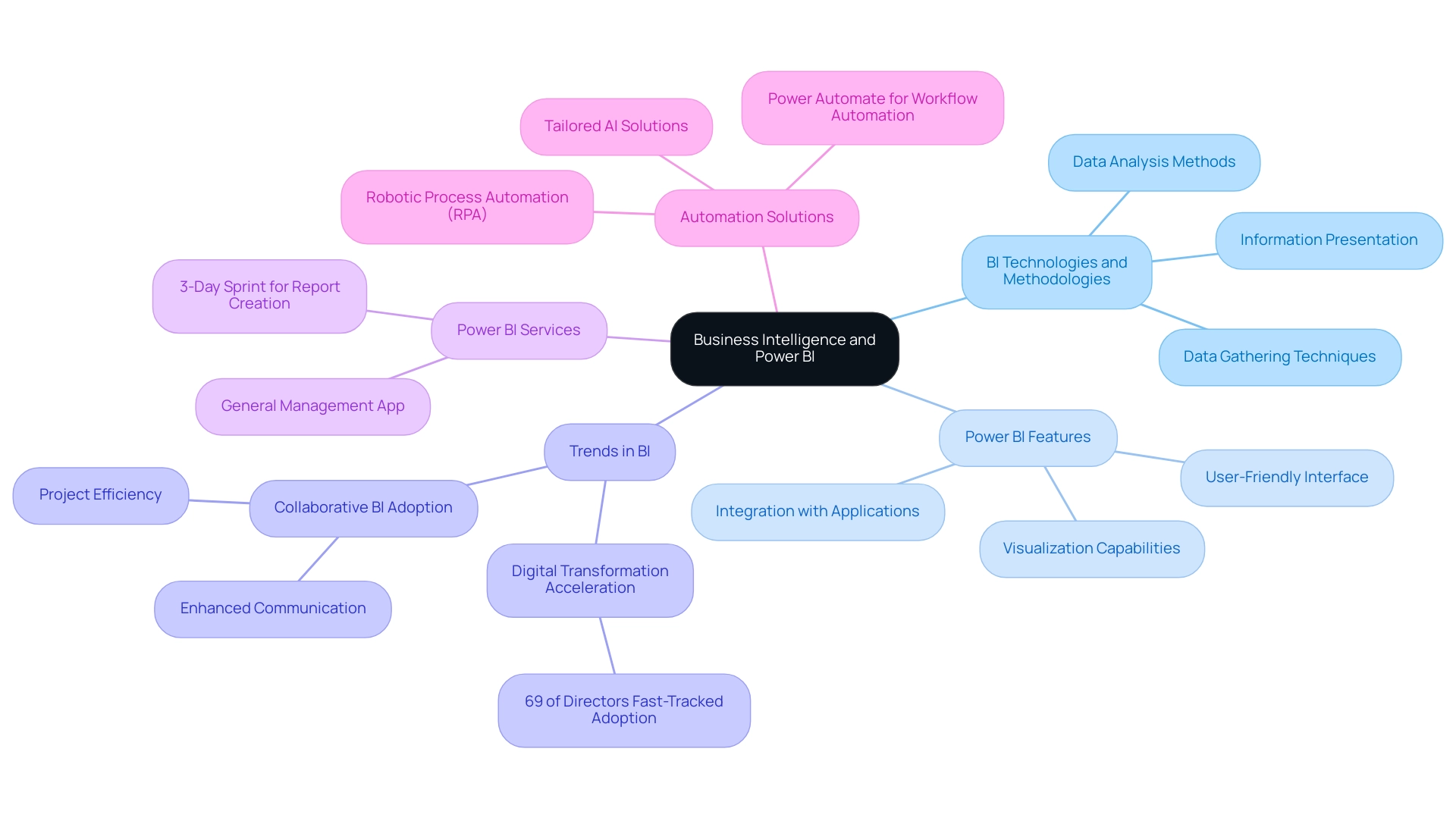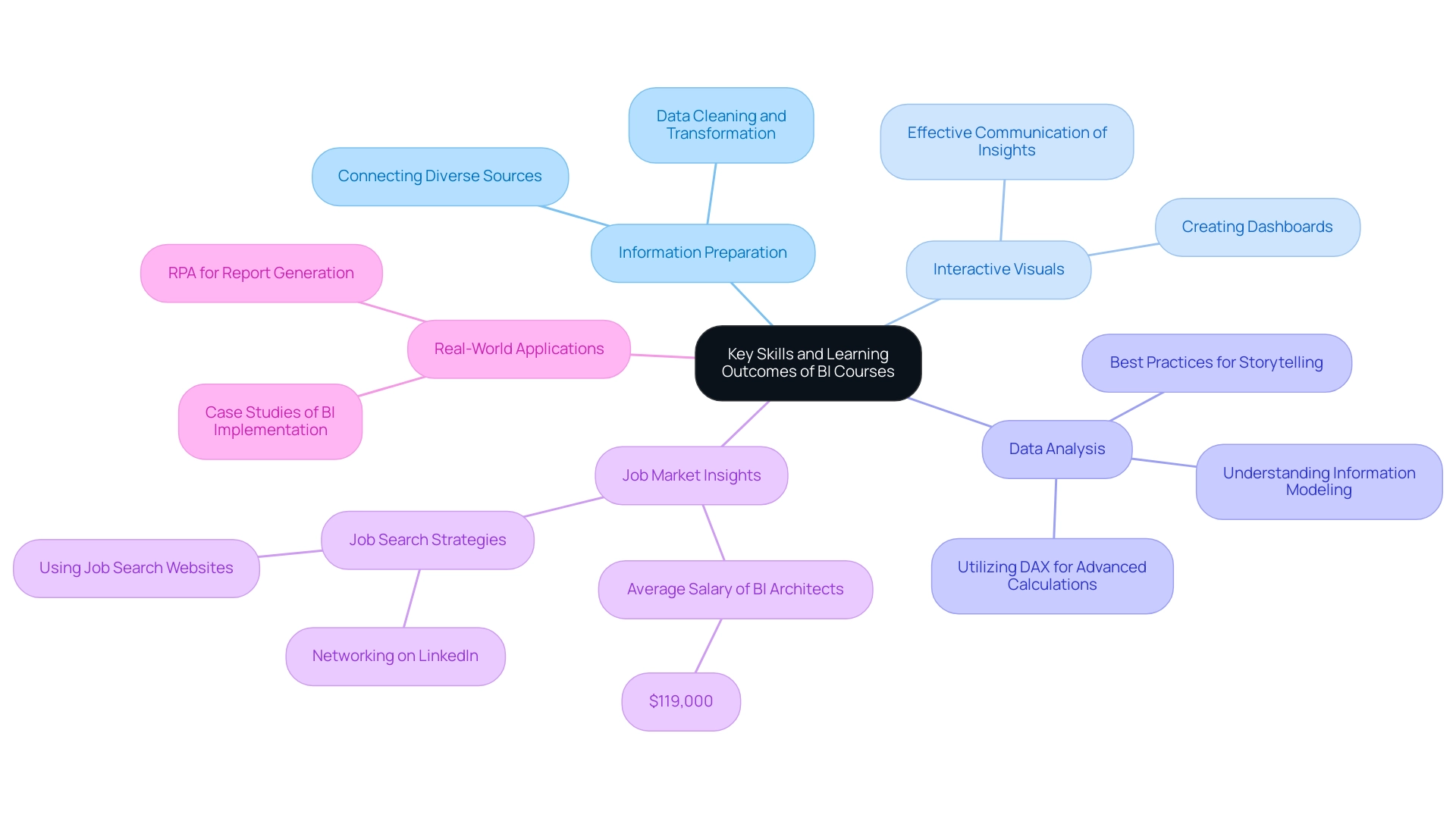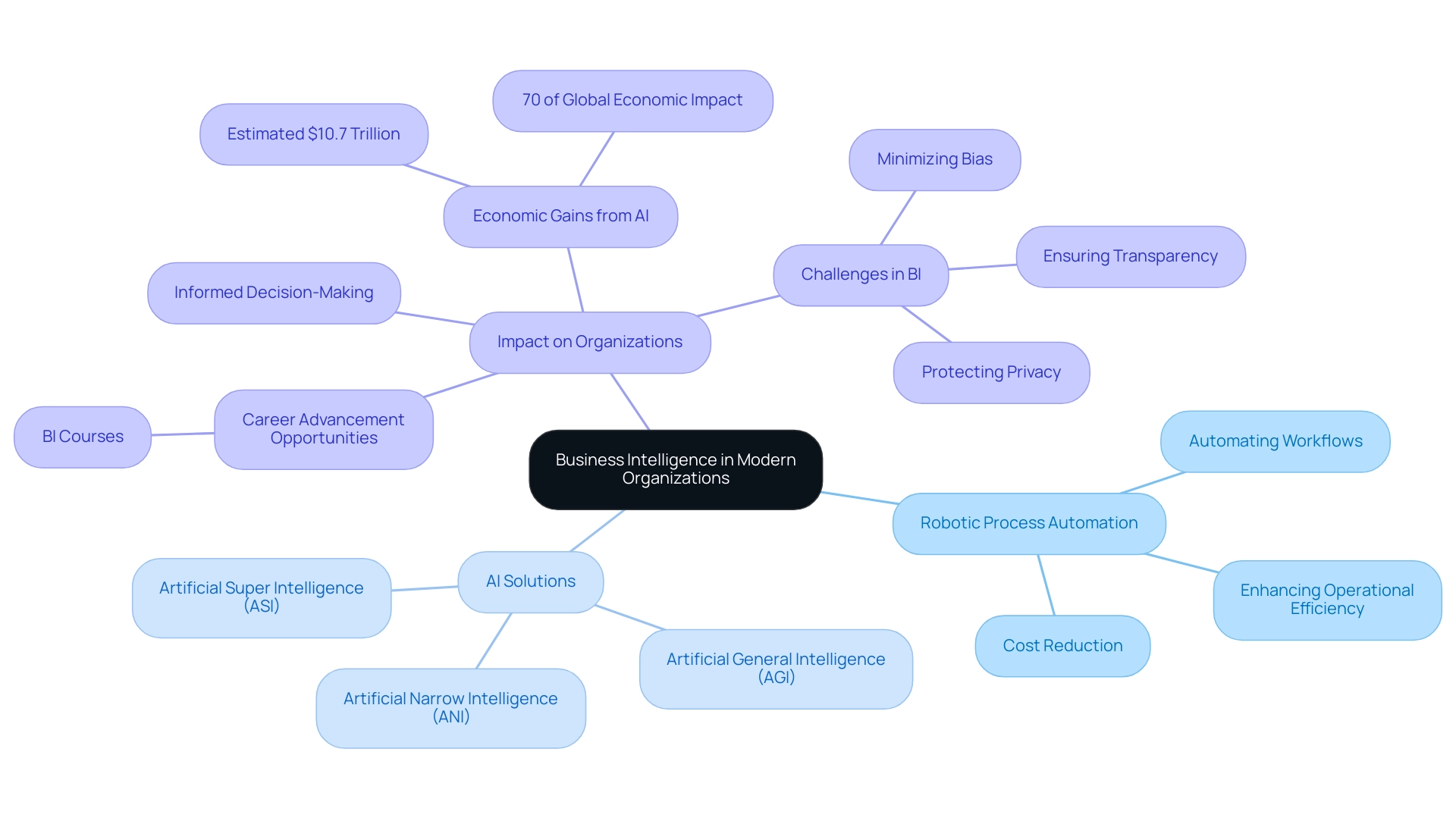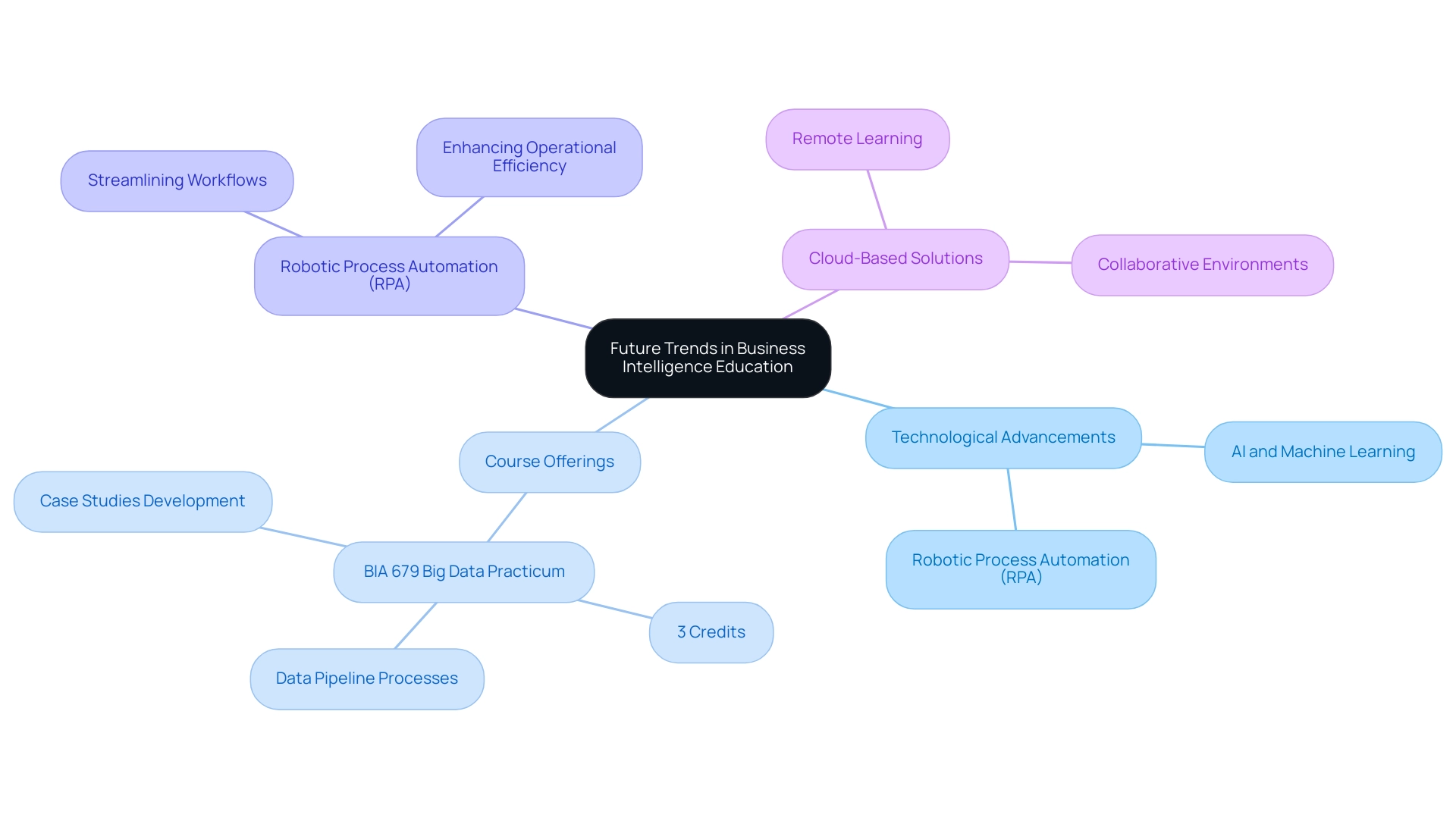Introduction
In an era where data drives decisions, Business Intelligence (BI) has emerged as a cornerstone for organizations seeking to navigate the complexities of modern markets. With tools like Power BI leading the charge, companies are empowered to transform raw data into actionable insights that enhance operational efficiency and foster strategic growth.
As the demand for data-savvy professionals continues to rise, understanding the nuances of BI and its integration with technologies such as Robotic Process Automation (RPA) becomes paramount.
This article delves into the critical components of BI, the skills necessary to excel in this field, and the future trends shaping BI education, providing a comprehensive roadmap for organizations and individuals alike to harness the full potential of their data.
Understanding Business Intelligence and Power BI
BI courses encompass the technologies and methodologies for gathering, analyzing, and presenting information, which is essential for informed decision-making. Among the top BI tools, Power BI, created by Microsoft, is notable for its capability to convert raw information into meaningful visual representations that can be shared across entities or integrated within applications and websites. This capability is especially crucial as Aditya Rayaprolu highlights, ‘69% of directors have accelerated digital transformation‘ in response to changing market conditions, emphasizing the necessity for organizations to utilize information effectively.
Companies with over 10,000 employees favor collaborative BI to enhance communication and project efficiency, illustrating a significant trend in the BI landscape. Power BI streamlines the visualization process, allowing organizations to make informed decisions effortlessly. Its user-friendly interface and robust functionality are complemented by our Power BI services, which include:
– A 3-Day Sprint for rapid report creation
– The General Management App for comprehensive management reviews
Additionally, we offer streamlined workflow automation through Power Automate, allowing you to automate processes efficiently while assessing ROI risk-free. Furthermore, our Robotic Process Automation (RPA) solutions can significantly enhance productivity by automating repetitive tasks, freeing your team for more strategic work. Tailored AI solutions also support your intelligence efforts by providing targeted technologies that align with your specific goals.
As the BI landscape experiences rapid evolution and expansion, understanding and utilizing BI courses in Power BI becomes essential for those aiming to enhance operational efficiency, tackle challenges such as time-consuming report creation, inconsistencies, and lack of actionable guidance, and propel organizational success. Explore our Actions portfolio and book a free consultation to discover how our services can transform your business intelligence capabilities.

Key Skills and Learning Outcomes of BI Courses
Business Intelligence (BI) courses are specifically designed to equip participants with a comprehensive skill set vital for effective analysis and visualization, especially when navigating the complexities of today’s information-rich environment. These programs typically cover essential competencies such as connecting and preparing information from diverse sources, including Excel, databases, and cloud services. A significant focus is placed on creating interactive visuals and dashboards that effectively communicate complex insights in a clear and engaging manner.
Key learning outcomes encompass:
– Understanding information modeling principles
– Utilizing DAX (Data Analysis Expressions) for advanced calculations
– Employing best practices for compelling storytelling
Upon completing the BI courses, participants will acquire the skills needed to transform their entities’ information into actionable insights, ultimately enhancing decision-making processes and boosting operational efficiency. Additionally, with BI architects earning an average annual salary of $119,000, acquiring these skills presents a noteworthy financial advantage.
Real-world strategies, such as networking with BI professionals and leveraging job search platforms like LinkedIn, can significantly improve the chances of securing a BI analyst position, as demonstrated in the case study titled ‘Job Search Strategies for BI Analysts.’ As noted by Alexander S. Gillis, a technical writer for What is, ‘This article, originally published in 2020, was updated in October 2024 for timeliness and to add new information,’ emphasizing the ongoing relevance of BI education in today’s job market. Furthermore, grasping the difficulties of lengthy report generation, information inconsistencies, and the lack of clear actionable guidance can enable entities to utilize BI and RPA effectively.
RPA can simplify the report generation process, decreasing time spent on repetitive tasks and minimizing inconsistencies by automating information collection and reporting. Incorporating successful case studies, such as those from leading companies that have implemented BI solutions to enhance their operational efficiency and decision-making, can further illustrate the transformative potential of BI and RPA in driving growth and innovation.

The Importance of Business Intelligence in Modern Organizations
In today’s data-centric environment, Business Intelligence (BI) is essential for entities striving to make informed decisions. By leveraging Robotic Process Automation (RPA) alongside BI tools, companies can automate manual workflows, significantly enhancing operational efficiency and reducing costs. BI enables entities to analyze extensive data sets, identify trends, and extract actionable insights that fuel strategic initiatives.
The integration of tailored AI solutions further streamlines this process, allowing businesses to navigate the overwhelming AI landscape effectively. This multifaceted approach not only elevates customer satisfaction levels but also positions organizations for growth in a rapidly evolving technological landscape. The increasing dependence on large sets of information and the necessity for real-time analytics has led to a rise in demand for professionals skilled in BI and RPA.
As a reflection of this trend, the World Economic Forum notes that 58% of companies view new innovations as a job creator, underscoring the potential for career advancement through BI courses. Furthermore, cloud computing has become the leading technology for companies investing in information and analytics, with 48% of technology leaders indicating investments in this area. PwC estimates that the economic gains from AI in regions like China and North America will reach $10.7 trillion, accounting for nearly 70% of the global economic impact, emphasizing the transformative power of data analytics in modern business.
As organizations prepare for 2024, understanding the importance of BI, RPA, and tailored AI solutions becomes crucial, given their proven impact on decision-making and operational excellence. Additionally, key considerations in the field of BI include minimizing bias, ensuring transparency, and protecting privacy, especially in light of AI advancements. To illustrate the current state of AI technology, it is important to recognize the three types of AI:
1. Artificial Narrow Intelligence (ANI)
2. Artificial General Intelligence (AGI)
3. Artificial Super Intelligence (ASI)
With only ANI being operational at present.
This context highlights the relevance of BI tools in navigating the complexities of modern data environments.

Future Trends in Business Intelligence Education
The landscape of Business Intelligence is poised for transformation as technological advancements, particularly in artificial intelligence and machine learning, continue to unfold. However, navigating the overwhelming AI landscape can be challenging for companies. Leveraging Robotic Process Automation (RPA) will not only streamline manual workflows but also enhance operational efficiency, allowing organizations to effectively address task repetition fatigue and staffing shortages.
Emerging trends in BI education will progressively incorporate these powerful BI courses, equipping students with the skills to harness AI-driven insights in their BI practices. The Hanlon Financial Systems Center offers vital technology and information sets for research and educational activities, enhancing the learning experience. Additionally, the BIA 679 Big Data Practicum, a 3-credit course, trains students to understand the entire value chain for data-intensive products and services, emphasizing data pipeline processes.
This course enables students to develop case studies that improve their critical thinking and technical skills, highlighting the significance of data-driven insights in organizational growth. The focus on cloud-based BI solutions further signifies a shift toward remote learning and collaborative environments, facilitating interaction among learners and instructors regardless of geographical boundaries. As Shardul Shinde, a graduate, wisely pointed out,
‘I selected intelligence and analytics because I wanted to engage in the tech field, but at the same time learn the commercial aspect of it.’
This combination of commerce and technology was a great fit for me. Staying informed about these evolving trends is essential for professionals eager to maintain a competitive edge in the rapidly changing BI landscape. The future of BI education includes BI courses that promise to not only enhance technical skills but also foster critical thinking through comprehensive training programs like the BIA 679 Big Data Practicum, ultimately driving business productivity and informed decision-making through the strategic application of RPA and BI.

Conclusion
In the rapidly evolving landscape of Business Intelligence (BI), organizations must prioritize the integration of robust tools like Power BI and innovative technologies such as Robotic Process Automation (RPA) to unlock their data’s potential. The insights gained from effective data analysis not only enhance decision-making but also drive operational efficiency, allowing businesses to remain competitive in a data-driven world. The emphasis on equipping professionals with essential BI skills through targeted education is crucial, as it prepares them to navigate the complexities of modern data environments and fosters a culture of informed decision-making.
As organizations look toward the future, embracing the latest trends in BI education, including the incorporation of artificial intelligence and machine learning, will be vital. This evolution in learning will empower the next generation of BI professionals to harness advanced analytics effectively, ensuring they are well-equipped to meet the challenges of an increasingly complex market. By investing in these educational pathways and leveraging state-of-the-art BI tools, companies can position themselves for sustained growth and innovation.
Ultimately, the path forward is clear: embracing BI and RPA technologies is no longer optional but essential for organizations aiming to thrive in today’s competitive landscape. By transforming data into actionable insights and fostering a skilled workforce, businesses can navigate the complexities of modern markets with confidence, driving success and achieving their strategic goals.

